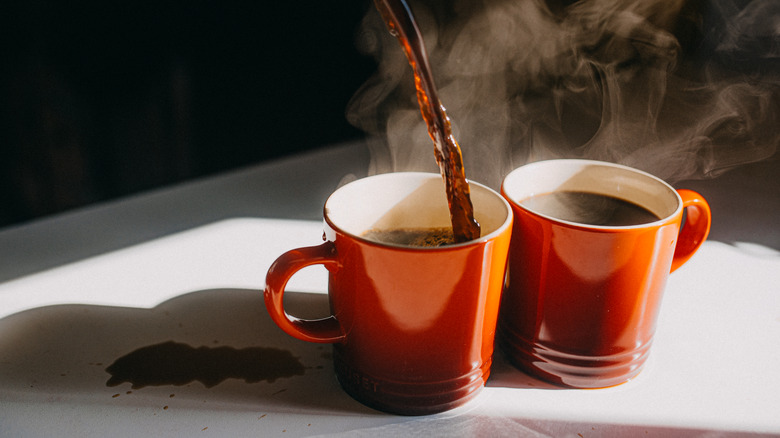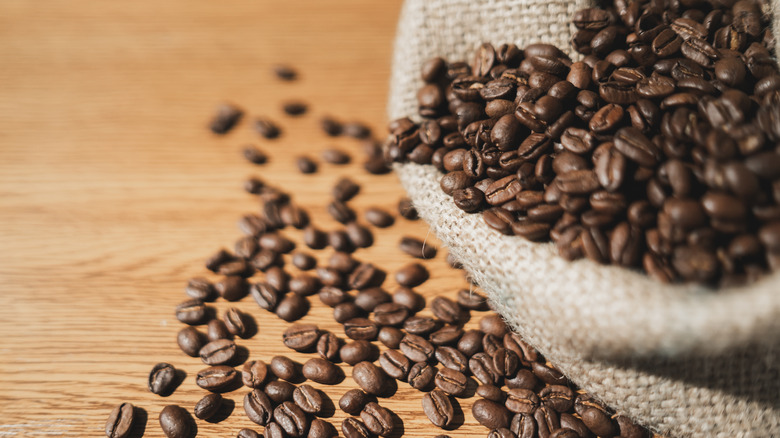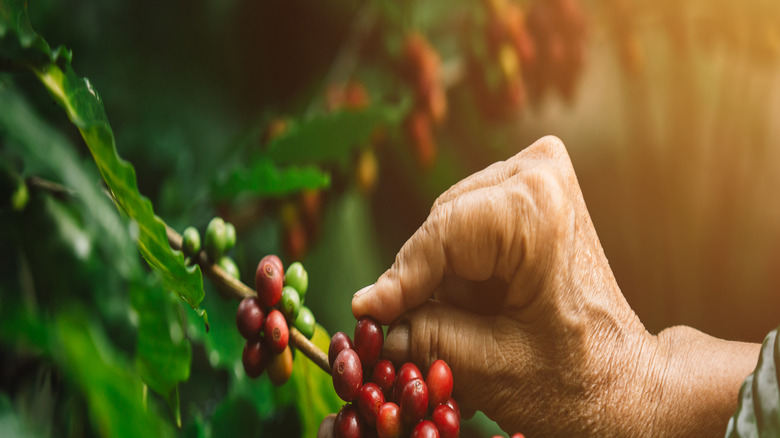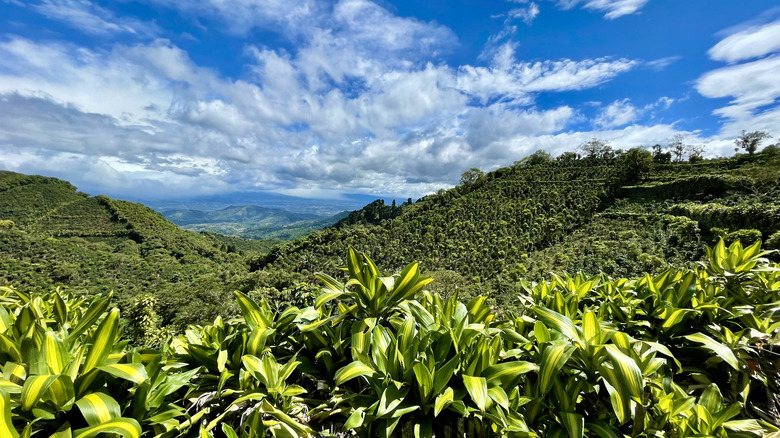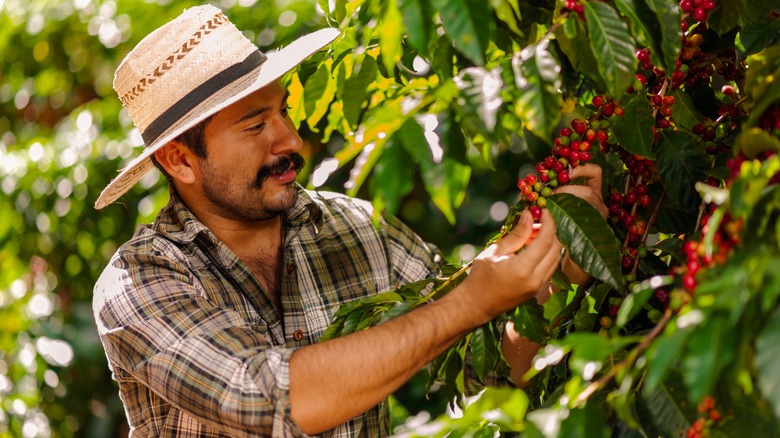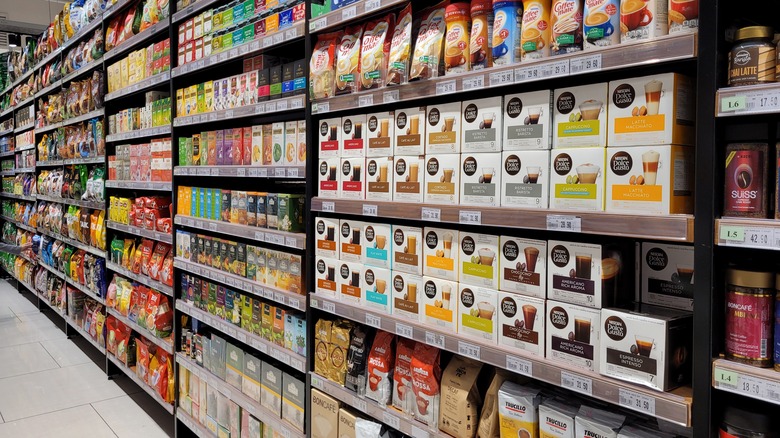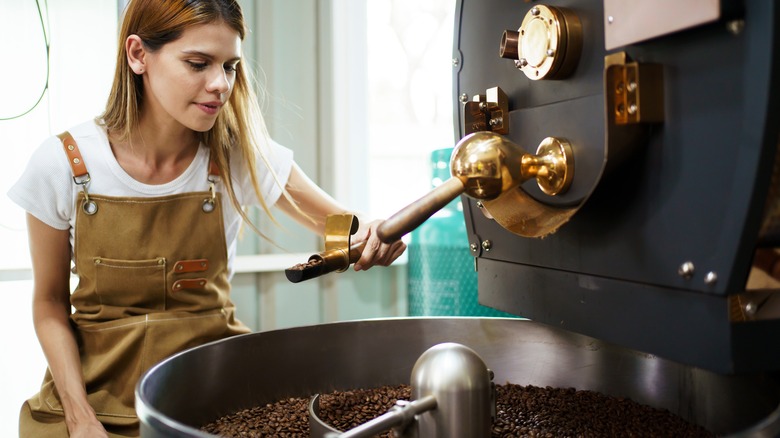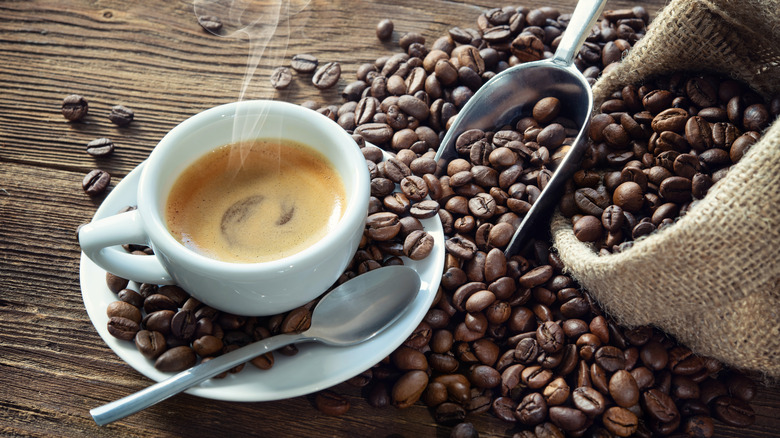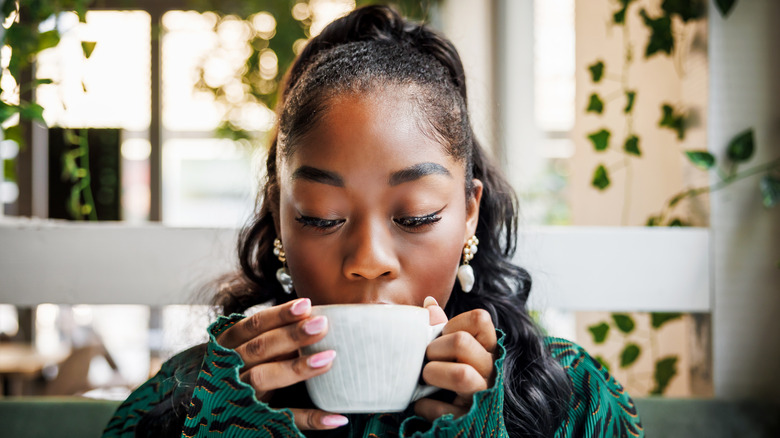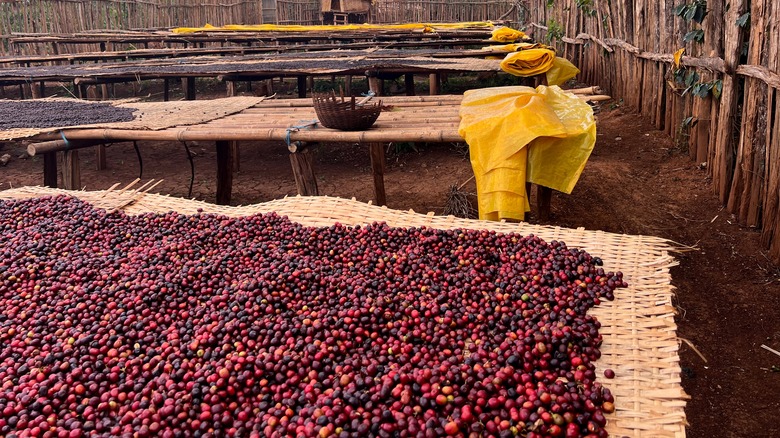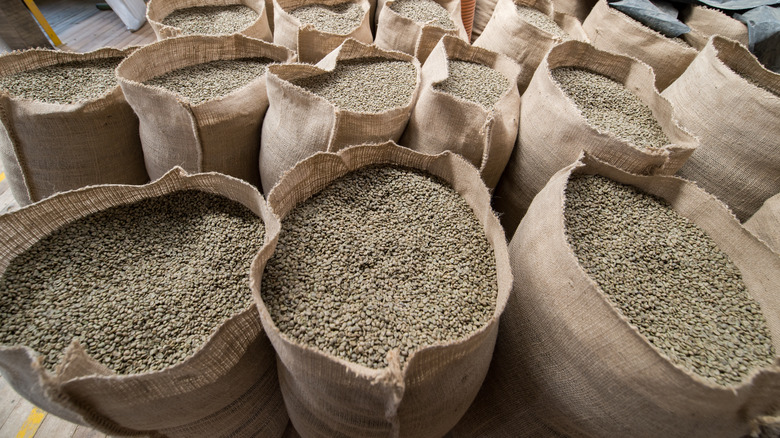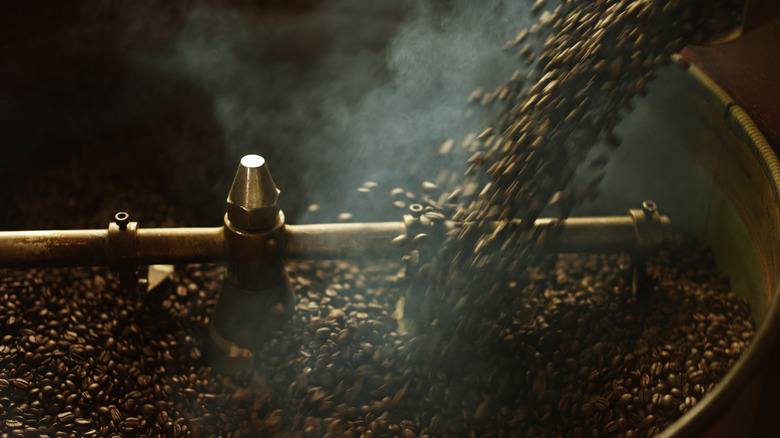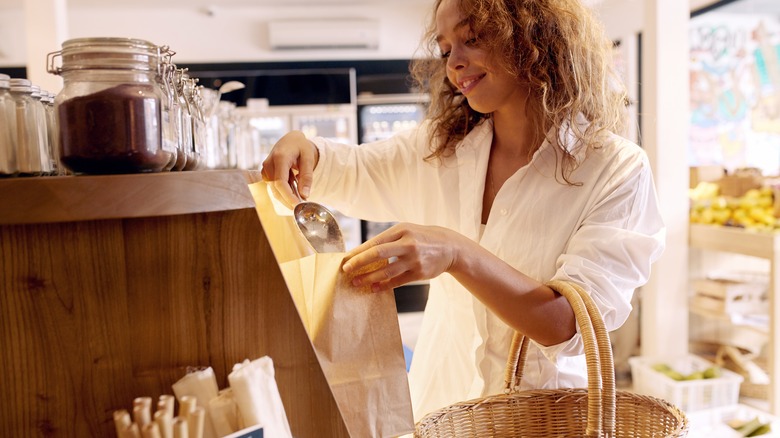Experts Weigh In On The Key Differences Between Cheap Vs Expensive Coffee
Although there's so much coffee on the market today, many of us still lump it into two broad categories: the cheap stuff and the expensive stuff. This can leave you wondering how cheap coffee and expensive coffee compare to one another and which one you should buy. Many of us are still trying to figure out whether it's worth spending top dollar on coffee beans or if we should just buy whatever's available for the lowest price at the supermarket.
As an experienced food and drink writer, as well as a former barista, I'm well-versed in coffee. However, I'm aware that I don't know everything about coffee, so I wanted to consult some experts in the field. To that end, I spoke to four authorities on coffee, including roasters and other industry professionals. I picked their brains about the many factors that affect the price of coffee and what this means in real world terms.
This helped me to uncover the real difference between cheap and expensive coffee in taste, bean type, processing methods, origins, growing practices, and more. I'm ready to give you the lowdown on the similarities and differences between pricy beans and ones that cost next to nothing. Of course, we'll also finish it all up with expert opinions on which sort of coffee you should actually buy. There are all kinds of coffee mistakes you might be making, but with our help, you don't have to let choosing the wrong beans be one of them.
Cheap coffee is often made using robusta beans
There are two main types of coffee beans: robusta and arabica. Robusta beans cost less to buy and produce, so cheap coffee is often 100% robusta or a blend of robusta and arabica. Expensive coffee, on the other hand, is almost always pure arabica. But what does this really mean for your cup of joe?
"Arabica beans have a sweeter, smoother taste and a more sophisticated flavor than other cultivars," Maria Caceres, owner of The Coffee Temple, tells us. "They will often bear fruity and chocolate-y notes." Robusta beans, meanwhile, don't have such a great flavor. "Their taste would be characterized as strong and harsh, ranging more toward the parameters of earthy or bitter, with some comparing it to charred rubber," Caceres says. For many, it's preferable to choose arabica beans, even if they come at a higher price.
Matt Lounsbury, president of Proud Mary Coffee USA, explains that it's not just the taste that makes robusta beans cheaper. "Robusta, as a species, is more productive and disease resistant, when compared to arabica," he notes. "Smaller yields and greater susceptibility to disease results in a higher cost of production for most producers growing arabica." This also means that robusta beans are cheaper for importers, roasteries, and coffee companies to buy, another way in which they usually find their way into cheap coffee.
Expensive coffee may come from pricier growing regions
Shonali Paul, founder of Paul John Indian Caffeine Company explains that the reason coffee is pricier from some areas is "because of the reputation of an origin, in that their practices and consistency of coffee quality has been good."
But it might not just be the country that makes a difference in the price; sometimes, this can be specific to smaller regions. "The highest quality coffee beans are produced in special microclimates within larger growing regions of Central and South America, Africa, and Asia/Indonesia," notes Brian Abernathy, master roaster at Grumpy Goat Coffee Company. For instance, some of the most expensive coffee comes from parts of Jamaica and Panama.
The area of a bean's origins might bump up their price, but it can also affect the flavor. Ethiopia is known for producing coffee with fruity, floral notes and high acidity. South American coffee beans, on the whole, have lower acidity with more chocolatey, nutty, and caramel-like notes. However, it's important to remember that all of this can vary a lot between countries and smaller regions.
Cheap coffee is more likely to be grown at a low altitude
Another factor in the price of coffee is the altitude at which it's grown, which affects growing conditions and logistics. Ultimately, it is more expensive to grow coffee at higher altitudes, though these environmental conditions will also affect flavor.
"At higher altitudes, there is a greater difference between daytime and nighttime temperature," Matt Lounsbury tells us. "Cooler temperatures cause the trees to mature more slowly, extending the time between planting and harvest. When the trees do begin to produce fruit, they do so in smaller quantities (when compared to lower altitudes), and the fruit takes longer to mature and ripen." He notes that it's also tougher to get people up the mountain to harvest the coffee. All these factors increase the cost of production that farmers face, bumping up the prices.
So, high altitude coffee costs more, but does it taste better? Maria Caceres says that it makes a difference to coffee quality, as altitude is definitely one of the factors that affects how coffee tastes. "The varieties of beans grown at higher altitudes have a slower growth rate," she says. "This ends up giving a more complex flavor and beans that are denser."
Expensive coffee can mean growers who put more care and attention into the process
If you pay more for coffee, it's likely that the producers put more care, attention, and expertise into growing it. Coffee is a tricky crop to grow well, with a range of factors that go into producing the highest quality beans. Meanwhile, some farmers just want to put out a high-yield crop without much attention to quality. These kinds of beans are often the ones you'll be able to buy cheaply, while pricier ones have been grown with far more consideration.
"Normally those expensive varieties are grown with more care and skill," Maria Caceres says. "In general, high-end coffee requires careful farming, right from selection of the best coffee cherries to ideal conditions for growing," she explains. Growers can't just plant any kind of coffee in any location and hope for the best. For prime results, they need to grow the correct types of beans for the area they're working in, then cultivate plants with skill.
"This process produces beans that are really better in quality and actually justifies the added cost," says Caceres. "Not only that, but these beans are actually picked at the peak of their ripeness, and this fact adds to the difference in flavor." It's like the difference between buying heirloom tomatoes from a farmer's market and any old ones from the supermarket produce aisle.
When coffee is cheap, poor pay and unfair labor practices may be involved
The cost of living seems to be ever increasing and so we understand wanting to save money on your grocery bill. But when coffee is cheap, the harsh truth is that someone has probably been exploited along the way. These include coffee estate owners being paid unfairly for their beans to poor labor practices that affect workers on these farms.
"It's a pretty good rule of thumb to assume that really cheap coffee to the consumer means that growers might not have received a good price," says Matt Lounsbury. "Generally, cost of labor, along with heaps of other increasing costs of producing coffee are factors in what coffee should cost." However, he notes that, all too often, these details aren't reflected in the cost of coffee to the consumer and speak to corners that have been cut.
Maria Caceres believes that low prices are usually the result of practices that prioritize minimizing costs instead of paying producers reasonable prices, treating them and workers fairly, or adopting sustainable farming practices. "Labor conditions have a large impact on coffee prices," Caceres tells us. "Fair trade, direct trade, and ethically sourced coffee often comes with a higher price to ensure the farmer is paid correctly for work."
Expensive coffee may have been roasted in small batches by a specialty producer
Expensive coffee often comes from independent specialty producers and is roasted in small batches. These producers tend to go into the industry because of a passion for coffee and truly care about the quality of the beans they sell. On the other hand, cheap coffee often comes from large corporations that care more about making coffee that's just good enough that people will continue buying it.
"Buyers can expect a higher degree of expertise from small roasters as they are taking extra care into sourcing high quality green coffee beans and are roasting in smaller batches to ensure freshness," says master roaster Brian Abernathy. "Small roasters also have a higher degree of control over the roasting process, which can result in much better tasting coffee."
"Most of the small roasteries are quality-, freshness-, and precision-oriented," says Maria Caceres, who agrees that smaller roasters can pay greater attention to detail. "The roast profile will generally be tweaked to get the best out of each given bean type," she notes. Caceres also praises the expertise of small roasters and says they're "more transparent about where they source and, hence, ethical." She admits that this all means you can expect a higher price tag, though.
Cheap coffee is more likely to be a blend
Cheap coffee is more likely to be a blend, while more expensive coffee is likely to be what's called single-estate or single-origin. But what's the difference between a blend and single-origin, not to mention between single-origin and single estate — and what difference does it make to your brew?
"Single-origin coffee is from one country or region and represents the local taste profile, while single-estate coffee represents beans from a specific farm or estate and is inclined to manifest the peculiarities of the place," explains Maria Caceres. If a farm produces exceptional coffee, then single-estate beans can be amazing. But, while blends have gotten a bit of a bad rep, single-estate doesn't necessarily mean the coffee is better. "Blends involve beans that are mixed from different regions or farms to strike a balance in flavor," Caceres continues. "Blends are relatively cheap because they can be made from high-quality beans blended with more affordable beans to bring down the average cost."
A blend doesn't necessarily have to be a bad thing. "The great thing about blends is that the result can often be greater than the sum of its parts. Blending coffees together can often create a product that tastes better than any of the components individually," says Matt Lounsbury. "But yes, blends tend to be cheaper."
You can expect a better flavor overall from expensive coffee
When you splash out for coffee, are you going to notice the difference or will you be disappointed? To many, expensive coffee just objectively tastes better. It's just in a different league compared to cheap coffee produced by big corporations.
"Generally, the more expensive the coffee is, the better it tastes," says Maria Caceres. "This is due to superior beans, processed with great care, and roasted by masters," She explains that you can expect flavors that are subtle and more complex, with a smoother finish and fewer bitter notes. "Expensive coffee brings out certain tastes of fruit, chocolate, or flower undernotes, while cheaper coffee may have some sort of generic flavor that is one-dimensional in nature."
However, it's worth noting that coffee is a bit like wine — what you like will be highly individual. If you buy a coffee with high acidity and fruity notes but you're a fan of richer, more chocolatey coffees, you might not like it even if it comes from a high-end brand. That's why it's also worth figuring out what tasting notes, roast levels, regions, and processing methods you prefer in a coffee.
If coffee is cheap, it may have been processed using a more cost-effective method
After coffee fruits, known as cherries, are picked, they can be processed in a variety of ways to remove the flesh and leave the beans behind. Some methods are more cost-effective than others, meaning pricier methods will produce more expensive coffee. However, it doesn't necessarily follow that beans processed using a cost-effective method are cheap, as other factors readily come into play. "Processing method can play a small role in the price of the coffee," remarks Brian Abernathy. "However, the quality of the coffee that is being processed is a more significant factor."
"More labor and more resources come into play with washed, or wet, processing," Maria Caceres explains. In washed processing, the coffee cherry is removed from the bean within a few days of being picked. Then, the beans are washed before the drying process begins. This resource-intensive method thereby increases the price.
In natural processing, the beans are left to dry with the fruit intact. Caceres notes this can bring out complex, fruity flavors. Because the process is simpler, the resulting coffee tends to be cheaper.
Supply and demand affects coffee prices
The price of coffee doesn't just come down to quality. There's the issue of supply to consider, as when certain types of coffee are scarce, they can demand a higher price. "Supply is a factor in coffee pricing," Brian Abernathy tells us. "For example, Jamaican Blue Mountain coffee costs more because of the small supply that comes off the island." Certain other coffees can be quite rare, because it can only grow in small, specific regions or because it's crafted in a way that produces a small yield.
Then, there's demand, which means there must be a market for the coffee. In other words, just because there's a scarcity of something doesn't mean it can fetch a high price. It must be sought-after. Fluctuations in supply and demand can cause rises and falls in the price of coffee. "Coffee prices change constantly, based off of supply and demand," explains Shonali Paul.
Cheap coffee may have been roasted long ago
While there isn't a direct correlation between how recently coffee was roasted and its price, specialty coffee is likely to be freshly roasted and therefore on the pricier side. On the other hand, coffee sold by large corporations may have been roasted some time ago. These types of beans are usually cheaper.
"Most roasting companies that are dedicated to sourcing the best coffees they can find," says Matt Lounsbury. These companies "will only really sell coffees a few days off roast." Maria Caceres agrees. "More expensive coffee — smaller roasters — will almost certainly be fresher than less expensive supermarket blends," she says.
But why does the freshness of the roast matter? "The closer to the roast date that you consume the coffee the better tasting it will be," explains Shonali Paul. "There is a rest period after coffee is roasted which is generally around 3 to 7 days to let the negative combustion gasses come out of the roasted beans." According to Caceres, "The flavors in fresher roasts are livelier, and the fragrance is stronger, too [...] Coffee loses flavor over time while sitting on a shelf because it oxidizes, so the fresher, the better." That's why using old coffee beans is a bad idea.
Should you buy cheap or expensive coffee?
Now that you know more about the difference between cheap coffee and expensive coffee, which should you buy? While there are some products on the market where the difference between cheap and expensive versions are negligible, but coffee isn't one of them. As our experts have explained, there's a real and noticeable difference in quality between budget beans and their costly counterparts.
However, which one you should buy is up to you. "This will really depend on what matters to you in your coffee experience," says Maria Caceres. "If nuanced flavor, ethical sourcing, and supporting small producers is something you appreciate, then paying a premium is often worth it. Expensive coffee will give you a more pleasurable, complex, and satisfying cup."
Personally, coffee is one of the things I never feel bad about splurging on, because the difference is huge and I'm fussy about what I like. But not everyone is as picky. "If you only need a quick shot to pep yourself up and are really not particular about the flavor or origin of the bean, cheaper options may do," continues Caceres. "After all, it boils down to personal preference and priorities."
If you want the best-tasting coffee, be prepared to fork out a decent amount for coffee from a small roastery or artisan third-wave producer. But, if you can't tell the difference — or honestly don't care — go ahead and save your money.
